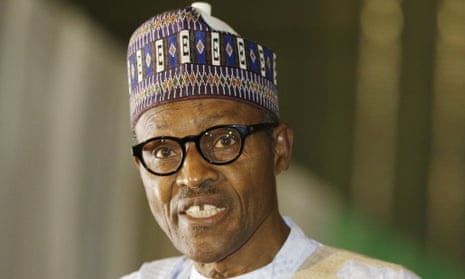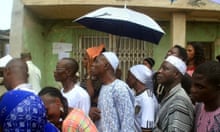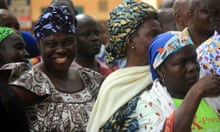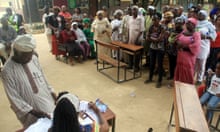Muhammadu Buhari, the president-elect of Nigeria, has pledged to crush the deadly six-year insurgency by the Islamist extremist group Boko Haram.
The former military dictator was speaking in the capital, Abuja, a day after his victory over the incumbent president, Goodluck Jonathan, in a largely peaceful election that has been praised by Barack Obama, David Cameron, Ban Ki-moon and other world leaders.
“I assure you that Boko Haram will soon know the strength of our collective will and commitment to rid this nation of terror and bring back peace,” Buhari said. “We shall spare no effort until we defeat terrorism. In tackling the insurgency, we have a tough and urgent job to do.”
Much of Buhari’s support was in the north, especially the north-east, where Boko Haram, which wants to carve out an Islamic caliphate, has killed at least 10,000 people since 2009. Jonathan’s failure to get to grips with the scourge was seen as critical in his defeat, although a military offensive in the last weeks before the election regained lost ground.
Buhari won the election by 15.4m votes to Jonathan’s 12.9m, prompting the incumbent to publicly accept defeat and urge his supporters that “nobody’s political ambition is worth blood”. Buhari’s supporters thronged the streets, many of them brandishing wicker brooms, his party’s symbol, to sweep away years of government corruption and waste.
When Buhari was a military ruler in the mid-1980s he investigated the previous government for graft, and many politicians received decades-long jail terms. There has been speculation that he could seek to prosecute Jonathan, whose government he has accused of massive corruption.
But Buhari, who will be inaugurated on 29 May, said on Wednesday: “Let me state clearly: President Jonathan has nothing to fear from me … He is a great Nigerian and still our president. He deserves our support and permanent respect by virtue of the office he has held.”
Jonathan’s once dominant People’s Democratic party (PDP) had raised fears during the campaign that a Buhari presidency would mark a return to autocratic rule. “Once a tyrant, always a tyrant,” ran one slogan.
But Buhari, 72, of the All Progressives Congress (APC), preached a receptive government “for all Nigerians” that would work to eradicate the “evil” of corruption.
He said: “There shall no longer be a ruling party again. [The] APC will be a governing party. We shall faithfully serve. We shall never rule over the people as if they were subservient to government. Our long night has past and the daylight of new democratic government has broken across the land.
“Democracy and the rule of law will be established in the land,” he added. “Let’s put the past behind us, especially the recent past. We must forget our old battles and past grievances and forge ahead.
“You shall be able to go to bed knowing that you are safe and that your constitutional rights remain in safe hands. You shall be able to voice your opinion without fear of reprisal or victimisation. You are all my people and I shall treat everyone of you as my own.”
Nigeria has been plagued by coups since gaining independence from Britain in 1960. It returned to civilian rule in 1999, after which the relentless Buhari tried and failed three times to become head of state. His success on Tuesday made him the first Nigerian to unseat an incumbent president via the ballot box rather than the barrel of gun.
“President Jonathan was a worthy opponent and I extend the hand of fellowship to him,” Buhari said. “We have proven to the world that we are people who have embraced democracy. We have put one-party state behind us.
“Our country has now joined the community of nations that have used the ballot box to peacefully change an incumbent president in a free and fair election. To me this is indeed historic.”
Jonathan, whose PDP had dominated Nigerian politics for 16 years, was widely praised for calling Buhari before the final result was counted on Tuesday night, neutralising widespread fears of a long and potentially violent deadlock. The country’s main stock index soared by 6.7%, its single biggest gain this year.
Obama urged both the winner and loser in the elections to work together to unify the country. The US president spoke separately on Wednesday with Buhari and Jonathan.
The White House says Obama applauded Jonathan for putting the country and its people first by urging his supporters to accept the election outcome. In his call with Buhari, Obama thanked the president-elect for promoting ca alm and peaceful voting process.
Obama has noted the challenges facing Nigeria, including the threat from Boko Haram. He said the US will continue to supporting Nigeria as it confronts those challenges.
Earlier Obama said: “President Jonathan has placed his country’s interests first by conceding the election and congratulating president-elect Buhari on his victory. I look forward to working with President Jonathan throughout the remainder of his term, and I thank him for his many years of service and his statesmanlike conduct at this critical juncture.”
Cameron said: “I send my warmest congratulations to General Buhari on being elected as Nigeria’s next president. This election has been a credit to the Nigerian people and a truly historic moment for Nigerian democracy.”
Ban, the UN secretary general, who spoke to both Nigerian leaders by phone on Tuesday, said: “The successful outcome of these polls is a testament to the maturity of Nigeria’s democracy.”
In Jonathan’s home town of Otuoke, in Bayelsa state, in the oil-rich southern delta region, people were coming to terms with the outcome. Elijah Ateki, chairman of the Otuoke community development committee, told Reuters: “We are sad and disappointed that our son lost the election. Since it is the will of God that Buhari should win, we have no choice than to accept. We are not going to cause any trouble over it because we cannot question God and the voice of the people.”
In Lagos, the commercial capital, there was little sign that anyone wanted to begin the daunting task of removing innumerable campaign placards and posters. Rasaq Alabi, chief security officer at Freedom Park, the site of a former British colonial prison, was upbeat: “All Nigerians need is a change of government and change of leader. Buhari is an experienced leader and I know he will deliver over the next four years. His manifesto is about electricity, education and housing. Let’s give him a chance.”
Entrepreneur Mo Ibrahim, whose foundation awards a prize for achievement in African leadership, said: “Today, we Africans are all proud of Nigeria and President Jonathan. Thank you Mr President. If you are seeking a legacy, you have definitely achieved it.”








Comments (…)
Sign in or create your Guardian account to join the discussion